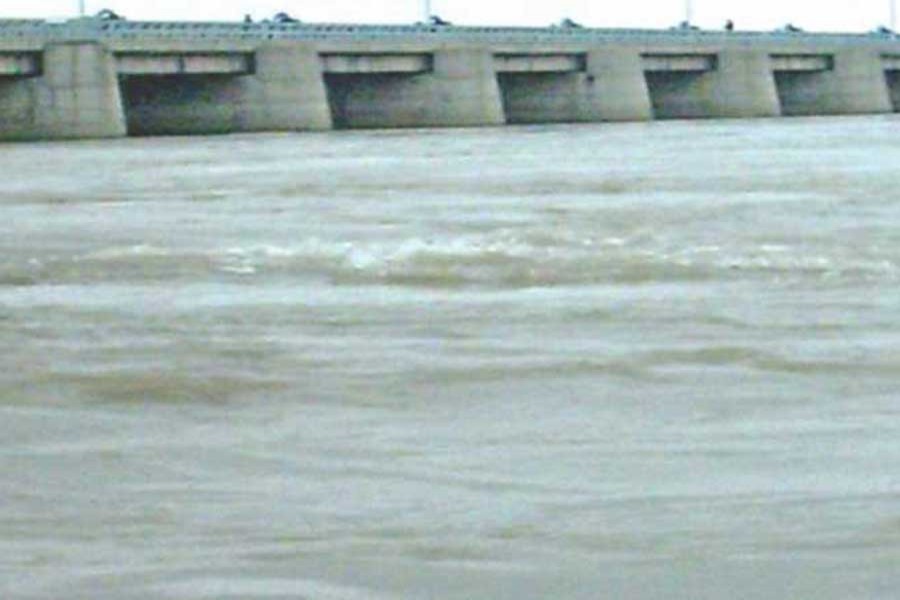Bangladesh apparently slows down the process of receiving funds from China for the much-talked-about Teesta river-management project, officials with knowledge of the development told the FE.
"We're quite ready to fund the project but yet to get any response from the Bangladeshi side to this end," a Chinese official told the FE on condition of anonymity.
Officials concerned cited the ongoing economic recession and geopolitical considerations as main reasons that prompted the authorities to be on the back-foot in implementing the megaproject.
The government has recently put some big projects on hold due to recession. Among them is the $980-million river-management project, funded by China $725.9 million and the rest by Bangladesh.
There is also geopolitical sensitivity about the project as, according to Indian media reports, the scheme is seen as a Chinese effort to exert its influence on the region.
According to officials of Bangladesh Water Development Board (BWDB), the implementing agency of the proposed project, the authorities are taking a go-slow policy.
"But we're not scrapping the contract with Power China, which conducted a feasibility study, as it has been extended for another two years," a BWDB official told the FE.
This means the project is still alive, he argued, saying that the study showed it would largely contribute to the development of the region.
Bangladesh plans to implement the project after failing to get any positive outcome from India over the signing of the Teesta water-sharing deal.
Both countries agreed to sign a deal during the then Indian PM Manmohan Singh's Dhaka visit, but it was scrapped at the fag end for stiff opposition from the Paschimbanga government.
After a long wait, Dhaka made a move to implement the Teesta management project to store water for the river.
In 2019, Bangladesh sought Chinese funds for the project with a request to replace it with the Dhaka-Sylhet highway project.
After a series of correspondence, finally in 2022, China showed its interest in funding the project.
Last November, Chinese Ambassador Li Jiming told the media that China was ready to support Bangladesh in the Teesta management project only if Bangladesh is determined to engage China.
"China has thousand years of experience in managing rivers like Yangtze, Yellow and many others… China wants to share these experiences with Bangladesh."
But he cited, "There is also some information, which says there might be some hesitation from Bangladesh side because of pressure from outside."
Mr Jiming said China is cautious about the project due to the geopolitical sensitivities surrounding it.
China also proposed a pilot project on the Teesta.
"Teesta River is not big enough and not small enough too. So, the best choice we have is to launch a pilot project to see how to deal with the river problem in Bangladesh as a whole."
It may be mentioned that a section of policymakers has been critical of the Chinese engagement in the project.
"Bangladesh has painted India in a bad light and for China it spells an opportunity. It's the first time China is getting involved in a river management project in Bangladesh," reports Indian news portal wionnews.com.
"The Teesta river crisis is China's opportunity to test the waters and an opportunity to whip up an anti-India sentiment, it is almost Nepal déjà vu and the bad news is that so far it appears to be working."
The project envisages building over 100-km embankment along both sides of the river, from upstream of the Teesta barrage near Indian border to the confluence with the Brahmaputra.
Under the project, massive drainage work will be done along 115 miles of the Teesta runs inside Bangladesh border to deepen the depth of the mid-river bed.
A 115-kilometre four-lane road will be built on the riverbanks, officials said, adding that barrage-cum-road will be built at various points to improve communications along the banks of the river.
"A big reservoir will be constructed to conserve huge surplus water that flows through the river every monsoon to ensure water supply for irrigation during dry season," said one official.
Major features of the mega project are 108-kilometre river dredging, 173-km river embankment on either side, construction of satellite cities on both banks and preservation of assets worth Tk 1,130 billion.
The execution of the scheme is projected to create an estimated 800,000 jobs, said BWDB officials involved with the project.
Originating in Sikkim and entering Bangladesh through Lalmonirhat, the 315-kilometre Teesta travels 153 kilometre through half-dozen northern districts, including Rangpur, Gaibandha, Nilphamari and Kurigram, before merging with the Jamuna at Fulchhari.


